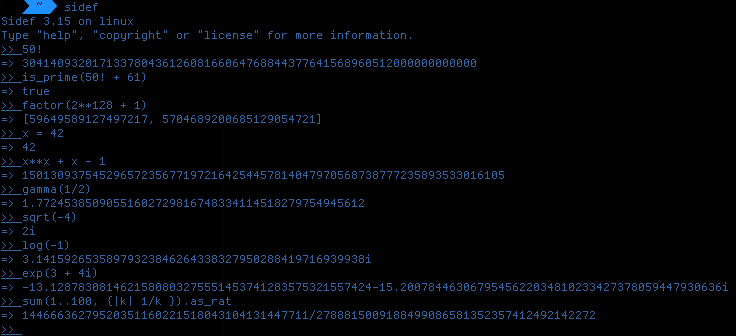Sidef is a modern, high-level programming language designed for versatile general-purpose applications, drawing inspiration from the principles of Ruby, Raku, and Julia.
** ** **** * ********* *********
* * ** * * **** ** ** ** ** ** ** **
** ** **** *** ********* * * *
** ** ** **** * * ****** ******
* * * * * * * * * **** ** ** ** ** ** **
** ** ** **** ****** ****** * *
** ** **** * * * ********* ***
* * ** * * **** ** ** ** ** ** ** **
** ** **** ********* ********* *
-
Key features of Sidef include:
- Object-oriented programming
- Functional programming
- Functional pattern matching
- Optional lazy evaluation
- Multiple dispatch
- Lexical scoping
- Lexical closures
- Keyword arguments
- Regular expressions
- Seamless integration with Perl modules
- Optional dynamic type checking
- Robust support for big integers, rationals, floats, and complex numbers
- Beginner's Tutorial (PDF)
- Number Theory Tutorial (PDF)
- RosettaCode: Sidef
- Gitbook: Sidef-lang (legacy) (PDF)
For assistance or inquiries regarding Sidef, please visit the dedicated discussion forum.
The Y combinator:
var y = ->(f) {->(g) {g(g)}(->(g) { f(->(*args) {g(g)(args...)})})}
var fac = ->(f) { ->(n) { n < 2 ? 1 : (n * f(n-1)) } }
say 10.of { |i| y(fac)(i) } #=> [1, 1, 2, 6, 24, 120, 720, 5040, 40320, 362880]
var fib = ->(f) { ->(n) { n < 2 ? n : (f(n-2) + f(n-1)) } }
say 10.of { |i| y(fib)(i) } #=> [0, 1, 1, 2, 3, 5, 8, 13, 21, 34]ASCII generation of the Sierpinski triangle:
func sierpinski_triangle(n) {
var triangle = ['*']
{ |i|
var sp = (' ' * 2**i)
triangle = (triangle.map {|x| sp + x + sp} +
triangle.map {|x| x + ' ' + x})
} * n
triangle.join("\n")
}
say sierpinski_triangle(4)Output:
*
* *
* *
* * * *
* *
* * * *
* * * *
* * * * * * * *
* *
* * * *
* * * *
* * * * * * * *
* * * *
* * * * * * * *
* * * * * * * *
* * * * * * * * * * * * * * * *
ASCII generation of the Mandelbrot set:
func mandelbrot(z, r=20) {
var c = z
r.times {
z = (z*z + c)
return true if (z.abs > 2)
}
return false
}
for y in (1 `downto` -1 `by` 0.05) {
for x in (-2 `upto` 0.5 `by` 0.0315) {
print(mandelbrot(Complex(x, y)) ? ' ' : '#')
}
print "\n"
}Output:
#
# ### #
########
#########
######
## ## ############ #
### ################### #
#############################
############################
################################
################################
#################################### #
# # ###################################
########### ###################################
########### #####################################
############## ####################################
####################################################
######################################################
#########################################################################
######################################################
####################################################
############## ####################################
########### #####################################
########### ###################################
# # ###################################
#################################### #
################################
################################
############################
#############################
### ################### #
## ## ############ #
######
#########
########
# ### #
#
- To explore further examples, kindly refer to: https://github.com/trizen/sidef-scripts
- CPAN: https://metacpan.org/release/Sidef
- PKGS: https://pkgs.org/download/perl-Sidef
- Arch Linux: https://aur.archlinux.org/packages/sidef/
- Slackware: https://slackbuilds.org/repository/15.0/perl/perl-Sidef/
- Copyright (C) 2013-2024 Daniel Șuteu, Ioana Fălcușan
This program is free software; you can redistribute it and/or modify it under the terms of the Artistic License (2.0). You may obtain a copy of the full license at:
https://www.perlfoundation.org/artistic-license-20.html
Any use, modification, and distribution of the Standard or Modified Versions is governed by this Artistic License. By using, modifying or distributing the Package, you accept this license. Do not use, modify, or distribute the Package, if you do not accept this license.
If your Modified Version has been derived from a Modified Version made by someone other than you, you are nevertheless required to ensure that your Modified Version complies with the requirements of this license.
This license does not grant you the right to use any trademark, service mark, tradename, or logo of the Copyright Holder.
This license includes the non-exclusive, worldwide, free-of-charge patent license to make, have made, use, offer to sell, sell, import and otherwise transfer the Package with respect to any patent claims licensable by the Copyright Holder that are necessarily infringed by the Package. If you institute patent litigation (including a cross-claim or counterclaim) against any party alleging that the Package constitutes direct or contributory patent infringement, then this Artistic License to you shall terminate on the date that such litigation is filed.
Disclaimer of Warranty: THE PACKAGE IS PROVIDED BY THE COPYRIGHT HOLDER AND CONTRIBUTORS "AS IS' AND WITHOUT ANY EXPRESS OR IMPLIED WARRANTIES. THE IMPLIED WARRANTIES OF MERCHANTABILITY, FITNESS FOR A PARTICULAR PURPOSE, OR NON-INFRINGEMENT ARE DISCLAIMED TO THE EXTENT PERMITTED BY YOUR LOCAL LAW. UNLESS REQUIRED BY LAW, NO COPYRIGHT HOLDER OR CONTRIBUTOR WILL BE LIABLE FOR ANY DIRECT, INDIRECT, INCIDENTAL, OR CONSEQUENTIAL DAMAGES ARISING IN ANY WAY OUT OF THE USE OF THE PACKAGE, EVEN IF ADVISED OF THE POSSIBILITY OF SUCH DAMAGE.

